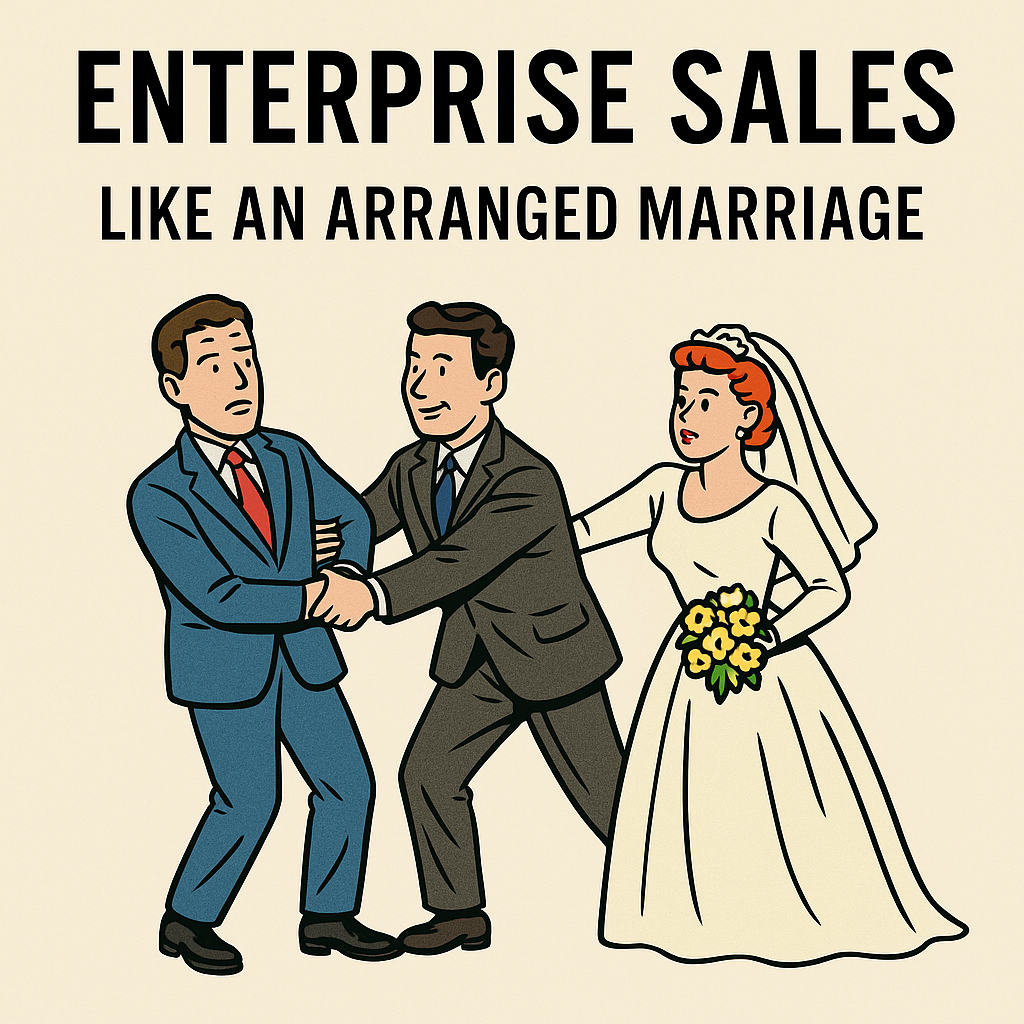Selling to Enterprises? Congratulations, You're Getting Married
B2B Sales Is Basically an Arranged Marriage in Business Casual
Thirteen years ago, I was wrapping up the biggest enterprise deal of my Salesforce career. We were hosting a fancy executive briefing with the client when I suddenly had a weird flashback.
Not to a boardroom. Not to a sales bootcamp. But to a Gujarati wedding.
Let me explain before you question my sanity.
Everyone from the Salesforce side had shown up — not just physically, but mentally and emotionally. Product leaders, engineers, executive sponsors, and even a few folks who seemed to wander in out of curiosity — all pitching in like distant cousins hauling chairs and stuffing wedding favors.
No one said, “That’s not my job.” They just got it done. No hierarchy, no red tape, just good old-fashioned chaos with a purpose.
And it hit me: real B2B enterprise sales isn’t corporate courtship. It’s an arranged marriage, complete with extended families, skeptical elders, and more background checks than a spy agency.
Let’s walk through the similarities.
1. It’s Never Just Two People
In normal dating, two people meet and either click or ghost each other. Easy.
In an arranged marriage? You’re not just marrying the person — you’re marrying their parents, their aunt from New Jersey, and at least three judgmental uncles.
That’s enterprise sales. You may think you’re selling to the VP of Ops, but in reality, you’re being silently judged by legal, procurement, IT, finance, risk, compliance, and probably the ghost of a previous failed vendor. Everyone gets a say. Everyone has opinions. And yes, someone is always comparing you to “the one that got away” from three years ago.
2. There’s Always a Matchmaker
Arranged marriages have a go-between — an auntie, a neighbor, maybe a friendly priest with a hobby for spreadsheets.
In B2B, your matchmaker is the internal champion. The person who says, “Hey, I think you two could really hit it off.”
They pitch your strengths, smooth over your weird quirks, and do damage control when someone in security says, “Wait, they don’t support single sign-on?” Without them, you're just another LinkedIn pitch collecting dust.
3. The Background Checks Are Brutal
Arranged marriage vetting isn’t just about compatibility. It’s about bank accounts, family drama, career paths, dental records, and whether your second cousin once posted something suspicious on Facebook.
In enterprise sales, expect:
Reference calls
Security audits
98-question RFPs
And the dreaded “Tell us about a time a client hated you and what you did about it”
They’re not just buying your product. They’re trying to make sure you won’t emotionally scar them.
4. Sparks Are Optional, Alignment Is Mandatory
In the movies, arranged marriages start cold and grow into love. You don’t need butterflies — you need belief.
Same with enterprise sales. Most champions are cautious, not giddy. They’re not dreaming about your UI; they’re wondering if you’ll still be answering emails six months from now. But if they believe you can grow together? That’s how deals close.
5. Functional Families Make It Work
The actual wedding is just the trailer. The marriage is the movie.
In that Salesforce deal, our team functioned like a dream in-laws committee. People filled gaps. No egos, just energy. We argued privately, but we showed up united in front of the customer. And when things got messy — which they always do — no one bailed.
That’s the secret. Functional families make for smoother marriages. And functional sales teams make for smoother onboardings.
6. The Good Ones Multiply
A strong arranged marriage doesn’t end at the wedding. Over time, families get closer, and suddenly your cousin is marrying their cousin, and everyone’s playing cricket together at family functions.
In B2B, that’s called expansion. One pilot turns into multi-team adoption. Then comes the referrals, the cross-sells, and that magical moment when your champion brings you into their next job.
When you show up consistently and act like a good in-law, you don’t have to beg for expansion. It just happens.
But Let’s Not Romanticize It Too Much
Some arranged marriages are just bad. Same with B2B deals.
Maybe the fit was forced. Maybe too many people got involved. Maybe the expectations were completely unhinged. Or maybe you just couldn’t stand each other. It happens.
The goal isn’t just to get to the altar. It’s to survive the honeymoon and make the day-to-day work.
Final Thought
So next time you’re chasing a big B2B deal, don’t treat it like a dating app swipe. Treat it like your cousin’s wedding.
Rally the team. Respect the process. Show up ready to commit.
Because anyone can close a deal. But making it work long-term? That takes patience, alignment, and a sales team that acts more like a family than a funnel.
Got your own weird analogy for enterprise sales? Let’s hear it. And give your matchmaker a shoutout while you’re at it.

